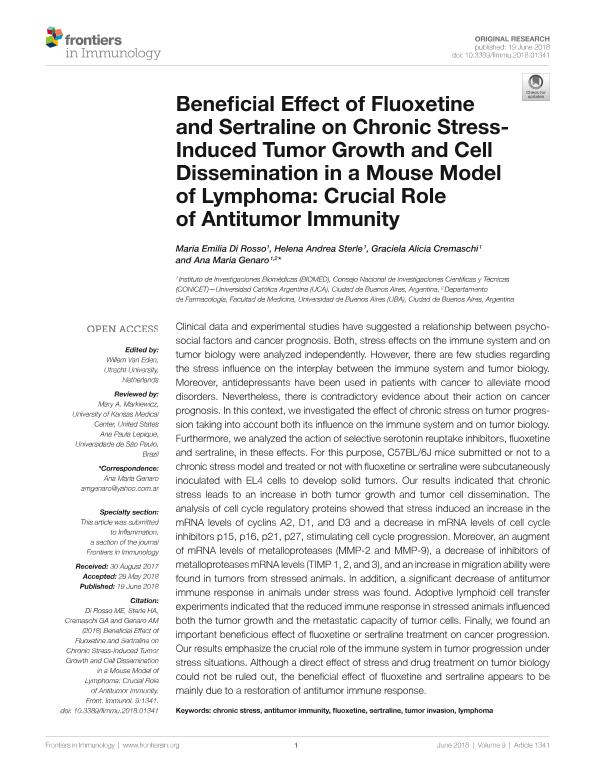Mostrar el registro sencillo del ítem
dc.contributor.author
Di Rosso, María Emilia

dc.contributor.author
Sterle, Helena Andrea

dc.contributor.author
Cremaschi, Graciela Alicia

dc.contributor.author
Genaro, Ana Maria

dc.date.available
2020-03-13T17:59:24Z
dc.date.issued
2018-06
dc.identifier.citation
Di Rosso, María Emilia; Sterle, Helena Andrea; Cremaschi, Graciela Alicia; Genaro, Ana Maria; Beneficial effect of fluoxetine and sertraline on chronic stress-induced tumor growth and cell dissemination in a mouse model of lymphoma: Crucial role of antitumor immunity; Frontiers Media S.A.; Frontiers in Immunology; 9; 1341; 6-2018; 1-16
dc.identifier.issn
1664-3224
dc.identifier.uri
http://hdl.handle.net/11336/99500
dc.description.abstract
Clinical data and experimental studies have suggested a relationship between psychosocial factors and cancer prognosis. Both, stress effects on the immune system and on tumor biology were analyzed independently. However, there are few studies regarding the stress influence on the interplay between the immune system and tumor biology. Moreover, antidepressants have been used in patients with cancer to alleviate mood disorders. Nevertheless, there is contradictory evidence about their action on cancer prognosis. In this context, we investigated the effect of chronic stress on tumor progression taking into account both its influence on the immune system and on tumor biology. Furthermore, we analyzed the action of selective serotonin reuptake inhibitors, fluoxetine and sertraline, in these effects. For this purpose, C57BL/6J mice submitted or not to a chronic stress model and treated or not with fluoxetine or sertraline were subcutaneously inoculated with EL4 cells to develop solid tumors. Our results indicated that chronic stress leads to an increase in both tumor growth and tumor cell dissemination. The analysis of cell cycle regulatory proteins showed that stress induced an increase in the mRNA levels of cyclins A2, D1, and D3 and a decrease in mRNA levels of cell cycle inhibitors p15, p16, p21, p27, stimulating cell cycle progression. Moreover, an augment of mRNA levels of metalloproteases (MMP-2 and MMP-9), a decrease of inhibitors of metalloproteases mRNA levels (TIMP 1, 2, and 3), and an increase in migration ability were found in tumors from stressed animals. In addition, a significant decrease of antitumor immune response in animals under stress was found. Adoptive lymphoid cell transfer experiments indicated that the reduced immune response in stressed animals influenced both the tumor growth and the metastatic capacity of tumor cells. Finally, we found an important beneficious effect of fluoxetine or sertraline treatment on cancer progression. Our results emphasize the crucial role of the immune system in tumor progression under stress situations. Although a direct effect of stress and drug treatment on tumor biology could not be ruled out, the beneficial effect of fluoxetine and sertraline appears to be mainly due to a restoration of antitumor immune response.
dc.format
application/pdf
dc.language.iso
eng
dc.publisher
Frontiers Media S.A.

dc.rights
info:eu-repo/semantics/openAccess
dc.rights.uri
https://creativecommons.org/licenses/by/2.5/ar/
dc.subject
ANTITUMOR IMMUNITY
dc.subject
CHRONIC STRESS
dc.subject
FLUOXETINE
dc.subject
LYMPHOMA
dc.subject
SERTRALINE
dc.subject
TUMOR INVASION
dc.subject.classification
Otras Medicina Básica

dc.subject.classification
Medicina Básica

dc.subject.classification
CIENCIAS MÉDICAS Y DE LA SALUD

dc.title
Beneficial effect of fluoxetine and sertraline on chronic stress-induced tumor growth and cell dissemination in a mouse model of lymphoma: Crucial role of antitumor immunity
dc.type
info:eu-repo/semantics/article
dc.type
info:ar-repo/semantics/artículo
dc.type
info:eu-repo/semantics/publishedVersion
dc.date.updated
2020-03-10T12:25:26Z
dc.journal.volume
9
dc.journal.number
1341
dc.journal.pagination
1-16
dc.journal.pais
Suiza

dc.journal.ciudad
Lausana
dc.description.fil
Fil: Di Rosso, María Emilia. Pontificia Universidad Católica Argentina "Santa María de los Buenos Aires". Instituto de Investigaciones Biomédicas. Consejo Nacional de Investigaciones Científicas y Técnicas. Oficina de Coordinación Administrativa Houssay. Instituto de Investigaciones Biomédicas; Argentina
dc.description.fil
Fil: Sterle, Helena Andrea. Pontificia Universidad Católica Argentina "Santa María de los Buenos Aires". Instituto de Investigaciones Biomédicas. Consejo Nacional de Investigaciones Científicas y Técnicas. Oficina de Coordinación Administrativa Houssay. Instituto de Investigaciones Biomédicas; Argentina
dc.description.fil
Fil: Cremaschi, Graciela Alicia. Pontificia Universidad Católica Argentina "Santa María de los Buenos Aires". Instituto de Investigaciones Biomédicas. Consejo Nacional de Investigaciones Científicas y Técnicas. Oficina de Coordinación Administrativa Houssay. Instituto de Investigaciones Biomédicas; Argentina
dc.description.fil
Fil: Genaro, Ana Maria. Pontificia Universidad Católica Argentina "Santa María de los Buenos Aires". Instituto de Investigaciones Biomédicas. Consejo Nacional de Investigaciones Científicas y Técnicas. Oficina de Coordinación Administrativa Houssay. Instituto de Investigaciones Biomédicas; Argentina. Universidad de Buenos Aires. Facultad de Medicina. Departamento de Farmacología; Argentina
dc.journal.title
Frontiers in Immunology
dc.relation.alternativeid
info:eu-repo/semantics/altIdentifier/url/https://www.frontiersin.org/articles/10.3389/fimmu.2018.01341/full
dc.relation.alternativeid
info:eu-repo/semantics/altIdentifier/doi/http://dx.doi.org/10.3389/fimmu.2018.01341
Archivos asociados
